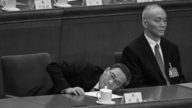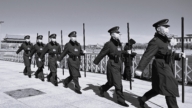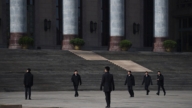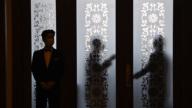【新唐人2012年7月23日訊】十八大前夕,中共當局整肅媒體動作頻頻。連日來,廣東和上海兩地的敢言媒體連續爆發高層震盪。其中,「南方報業傳媒集團」更是收到「13個採訪禁區」的文件﹔同時傳出,「六四」前後,「南方集團」各下屬報刊向中宣部遞交的檢討書高達17份。分析指出,這是中共十八大前的維穩舉措,也證明了中共當局所謂的政改只不過是一句空話。
今年5月,曾在中共喉舌《新華社》任職的廣東省委宣傳部副部長楊健,成爲第一位空降「南方集團」的黨委書記。
香港《明報》援引消息人士的話指稱,楊健出任黨委書記後,把「三報兩刊」,也就是《南方週末》、《南方都市報》和《21世紀經濟報導》,以及《南都週刊》、《南方人物週刊》,都納入「審讀」範圍。
所謂「審讀」,就是指內部專人把關的自我審查制度。在此之前只有《南方週末》和《南方都市報》需要審讀。
廣東政論作家朱健國:「實際上這次主要是因爲十八大,再就是一個廣東的經濟嚴重滑坡帶來的社會群體衝突的升級。在這種局面下,對媒體的打壓就全面升級了。所以以前宣揚的民主,所謂政治體制改革,那都是空話。」
報導說,最近,上級宣傳部門向「南方集團」正式下達了一份紅頭文件,列明13個採訪禁區,將以往的口頭禁令,升級為標準化的操作規範。
13個被禁止報導的議題包括:違背各級政策精神的議題,煽動所謂非法集會、結社、遊行的議題,涉及包括民運和法輪功等「五類人」的議題等。內部文件指稱,這13項內容只是審查重點,被禁止的議題不限於此。
前「北京大學新聞學院」副教授焦國標認爲,這13項禁區恰恰是中共內部進行黑箱操作的地方,所以不希望有媒體去報導和揭露,也禁止公衆去討論和關注。
《中國青年報》的《冰點》週刊原主編李大同則表示,這些審查重點是中共當局維穩思路的體現,對於媒體人來講早已經不新鮮。
原《冰點》週刊主編李大同:「它沒甚麽新鮮的東西,十八大以前它加緊控制,也就是這樣。這些東西任何媒體,任何時候都不許報。」
《明報》還透露,今年「六四」前後,「南方集團」各下屬報刊先後總共向中宣部遞交了17份檢討,遠遠高過往年的平均數,引起了內部員工嘩然。
在此之前,《南方人物週刊》發表了對緬甸民運領袖翁山蘇姬的專訪,以及60年代大饑荒親歷者的口述歷史,但這些報導被認為是在挑戰國家政策。「南方集團」開始派人專門「審讀」內容,並明確要求週刊「不要給別人抓把柄」。
7月初,海內外矚目的四川甚邡爆發示威的一星期內,原本敢言的「南方集團」刊物,完全沒有提及甚邡事件。消息指稱,當時總共有8篇稿件被「槍斃」,不得刊出。
對於「南方」報系自我審查和噤聲的行爲,焦國標引述了柏林圍牆被推倒後,審判東德警察時的「最高良知原則」—-「把槍口抬高一厘米的主權」。
前「北京大學新聞學院」副教授焦國標:「媒體記者在處理版面和選題的時候,他也有他的一厘米的主權。把這個一厘米的主權使用起來,就足以把中宣部的種種禁令給它衝倒。就是每一個媒體人都要善於、勇於使用自己的一厘米的主權。」
此外,由於發表觸動當局敏感神經的文章,廣州《新快報》在7月16號關閉多個新聞版面,並宣佈總編輯陸扶民被撤職。17號,上海《東方早報》社長陸炎也被免職,副主編孫鑑則遭到停職。
採訪/易如 編輯/李明飛 後製/周天
Communist Regime Internal Regulatory Document Lists 13 Censored Topics
As the 18th National Congress approaches,
the Communist regime carries out frequent purging activities against the media.
For days, outspoken media in Guangdong and Shanghai
experienced sequential shocks from the authorities.
Among them, the Nanfang Daily Press Group received
regulatory documents listing 13 censored topics after submitting
up to 17 self-critique reports to the Central Propaganda
Department around June 4 (Tiananmen Movement memorial).
This stability maintenance initiative prior to the National
Congress further confirms the so-called political reform is only an empty promise of the Communist regime.
This May, Yang Jian, Vice Minister of the Propaganda
Department of Guangdong,became the first Party Secretary of the Nanfang Daily Press Group promoted from elsewhere.
Hong Kong’s Ming Pao Daily News reported that
as the Party Secretary, Yang Jian quickly ordered review processes of three newspapers and two magazines under the Nanfang Daily Press Group.
The “review” process refers to the internal censorship
controlled by an appointed person. Prior to this, only two newspapers, the Southern Weekend
and Southern Metropolis Daily, were under regulation.
Guangdong political commentary writer, Zhu Jianguo:
“The upcoming 18th National Congress and the increasing social conflict under the severely damaged economy in Guangdong have led to the escalated suppress of the media. The democracy and political reform previously preached
were therefore meaningless."
It is reported that the CCP internal confidential and regulatory
document usually in red headings was issued to the Nanfang Daily Press Group.
With “13 Censored Topics”, this document officially
standardized the regulation formerly known as only verbal orders.
The 13 censored topics include the issues
that run against policies at any level,
that incite unlawful assembly, association, and procession,
that are related to pro-democracy movement and Falun Gong.
It is also alleged that censored topics are not limited to
the 13 focus points in the internal documents.
Jiao Guobiao, former associate professor of
School of Journalism, Peking University, believes that
the 13 censored topics are areas the CCP operate in black box.
The CCP would not allow any report and disclosure
by the media. They are also prohibited from public discussion and awareness.
Li Datong, former editor of the Freezing Point,
a weekly supplement of the China Youth Daily, indicates that
the Review process presents the CCP’s intention to maintain
stability and serves no surprise to the journalists.
Li Datong, former editor in chief of Freezing Point: “Tightened
control prior to the National Congress is nothing new.
None of these are allowed to be reported by any media
at any time."
Ming Pao Daily News also revealed that around June 4th
(the Tiananmen Massacre memorial), subsidiaries under
the Nanfang Daily Press Group submitted a total of
17 self-critique reports to Central Propaganda Department.
This high volume shocked the employees
of the Nanfang Daily Press Group.
Prior to this, the Southern People Weekly had
a special report based on an interview with
Burmese pro-democracy leader Aung San Suu Kyi, and
a witness’s oral history of the great famine of the 1960s.
Both reports were considered challenges to national policies.
The Nanfang Daily Press Group therefore specified
a specialist to “review” the content and clearly requested the Weekly not to “give a handle to others.”
For a whole week when the shocking Shifang protest occurred,
the outspoken Nanfang Daily Press Group
did not publish article about the Shifang incident.
It was alleged that a total of 8 articles were killed
during that time.
Jiao Guobiao shared his opinion of Nanfang’s self-censorship
behavior by referencing the “aiming the gun 1cm higher as dictated by your conscience” that the judge told the Ingo Heinrich case
after the Berlin Wall was torn down.
Jiao Guobiao, Former Peking University School of Journalism
Associate Professor: “The journalists also have their own rights of 1cm when dealing with the forum and topic.
This 1cm right is powerful enough to break down the
prohibition from the Central Propaganda Department.
Every journalist should fully operate his 1cm right.
In addition, on July 16, Guangzhou New Express Daily
closed a number of news pages due to its published articles
that touched the sensitive nerve of the authorities.
The editor-in-chief, Lu Fuming, was dismissed.
On 17 July, Lu Yan, president of the Shanghai Oriental
Morning Post was removed from the office, and Sun Jian, the deputy editor, was suspended.

























